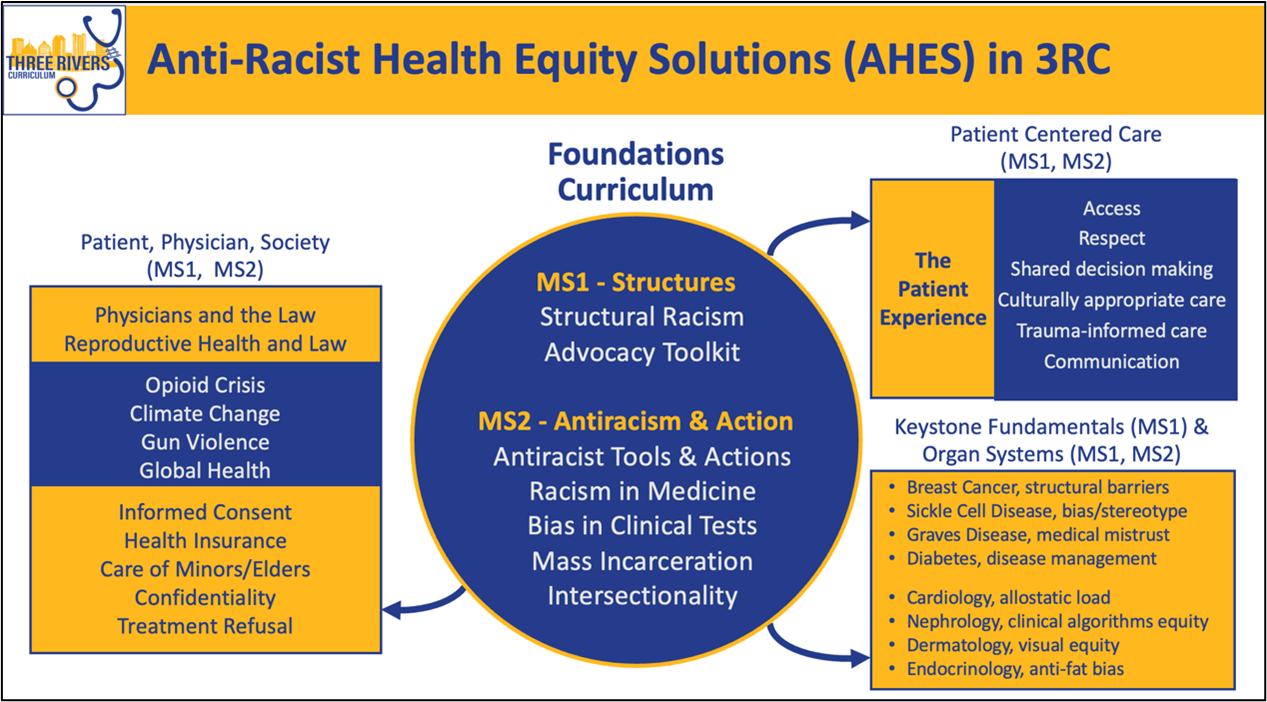Background
This two year course examines the impact of racism on health outcomes and teaches students to utilize their skills and influence to mitigate the effects of structural racism in medicine. An interdisciplinary team of content experts discuss race as a social construct, and the impacts of racism in medical education, criminal justice system, health outcomes, institutions and healthcare systems. This course also presents unique opportunities to partner with Pittsburgh area non-profits through the Community Alliance Program (CAP) and to engage with interprofessional student peers in allied disciplines such as the College of Pharmacy.

We value a curriculum and a learning environment that focuses on team-based collaboration. Felicia Savage Friedman is a trailblazer, she is the first community educator appointed to a content lead position. With her background as an educator, community leader, organizer and entrepreneur, she is founder and CEO of YogaRoots on Location, a yoga practice grounded in antiracist and trauma-informed practices. She is the lead for AHES in our curriculum. Dr. Thuy Bui is a general internist and specializes in global and refugee health. She has conceived of and spearheaded many initiatives related to social determinants of health, anti-racist curriculum, refugee health and environmental justice. She is the founding director of the Social Medicine Fellows Program and the lead for the social medicine thread in our curriculum. Dr. Eloho Ufomata is a general internist and specializes in gender medicine. She is the Assistant Dean for Equity and Justice in the curriculum. Dr. Alaina James is a dermatologist, and a health equity advocate. She is the founding course director of AHES.
Associated Faculty in Patients, Physicians and Society Block
AHES builds on related content within the Patients, Physicians and Society (PPS) Block which also occur on WOW Wednesdays.
Dr. Julie Childers specializes in addiction medicine and is certified in internal medicine, addiction medicine and hospice and palliative care. She is the lead for Ethics, Law and Professionalism and the PPS block director. Dr. Alfred Shoukry is a general internist who is dedicated to improving systems based practice and health and health care delivery. He is the lead for Population Health.
AHES in the Foundations Curriculum
AHES themes and actions are built on structural competencies that are first introduced in the Patient, Physician and Society courses. Core concepts and analytic frameworks are then strategically revisited and interrogated from different strategic vantage points in the companion clinical skills courses (Patient Centered Care) and in content-specific courses (Keystone Fundamentals and Organ Systems courses, among others). The Fall MS1 AHES curriculum focuses on systemic racism in healthcare institutions and recognizing advocacy as a means for physicians to enact systemic change. In Spring MS1, AHES content expands to include cultural and power hierarchies, clinical algorithms and bias in practice, intersectionality (disability, body size, gender and race). In Fall MS2, AHES discusses the impact of mass incarceration and develops anti-racist tools and action. Throughout medical school students have opportunities to participate in service, volunteerism, research, and advocacy that is rooted in the principles of anti-racist practices.
AHES Partnership with the Community Alliance Program (CAP)
The innovative Community Alliance Program (CAP) values and cultivates community partnerships. AHES and CAP, along with local organizations, support student engagement in practices centered on community strengths and community-directed goals. We work with community as co-equal partners to improve wellness of our fellow community members and sense of belonging. Together with our community partner organizations, we facilitate the development of our students’ professional identity to highlight trustworthiness, cultural responsiveness, restorative practices, and a strength-based mindset to carry throughout their careers.
AHES Leverages Interprofessional Education
Collaborative practices afford us the opportunity address macrolevel concerns that are beyond the scope of a single individual or group of individuals. We engaged with students and faculty from affiliated health-related disciplines (e.g., School of Pharmacy, School of Social Work, School of Law) to explore opportunities to work together and strategize how this teamwork can contribute to dismantling systemic forces that prevent make healthy living more difficult for some people based on racial, social, economic, and/or environmental disadvantage. We encourage innovative ideas. We foster continuing connections. And, we care for one another.
AHES in Clerkships and Beyond
Each clerkship has a social medicine component which critically interrogates the impact of societal problems such as racism, at the bedside. Students bring principles learned in the foundation’s curriculum to their practice during their clerkships.
Felicia Savage Friedman M.Ed
Community Educator and Leader
Founder and CEO, YogaRoots on Location
felicia.savage.friedman@pitt.edu
Thuy D. Bui, MD
General Internal Medicine
Professor of Medicine
buit@upmc.edu
